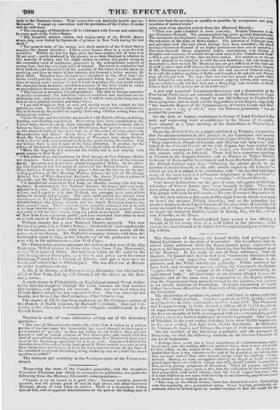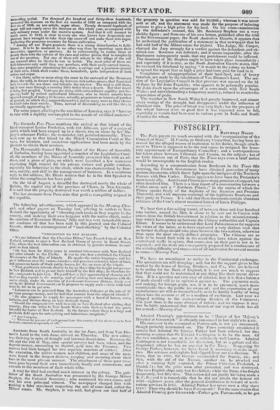The Governor of Janntien, e.:ir Lionel Smith, had prorogued the
Island Legislature to the 24th of September. His Excellency bud re- ceived many addresses front the Emancipation perty, expressive' of regret at his departure rend cordially thanking him for the support given to the Negroes. In ltis reply to One Of these addresses, from the Baptists, 54r Lionel said, that he had been "repeatedly threateued with assassieation,"—an expression which gave extreme olfenee to the planters, and the White inhabitants generally. Pablie meetings had been held, and resolutions paused, at ;leg tire Governor's declaration "a gross libel " on the "people of the islatol," lund " particularly do agricultural body." All knowledge of the threats alluded to was Xis-
ciaimed ; and at the same time an imputation in the Baptist address, that the Negroes had been unfitirly treated by the planters, wits asserted to be utterly destitute of foundation. Rewards amounting to 12,tiee dollars have been offered for the discovery of the parties who threatened the Governor.
The diminution of produce exported is exhibited in tables publianed in the West India journals. Jamaica exported, in 1830, produce veined at 1,750,504/. ; in 1837, 1,505225e ; inn leee, 1,442.570!. The 1?emerara and Essequebo crop, in 1838, showed a fellieg-ole of 15,178 hogsheads of' sugar compared with the average of the three preceding years ; and the first six months of 1839, as compared with the corresponding period of 183e, showed a further deficiency of 10,533 hogsheads. The exports of Trinidad, in the year ending el 1st July lealt., were 19,189 hogsheads; in the year' endiug Slot July 1539, 16,3:39 hogsheads. In Barbados, St. Vincent, St. Lucia, and Tobago, the crops of 1539 are also deficient.
On the conduct of the labouring population miml the prospects of Demerara, we find the following remarks in the Guiana Chronicle of the 2d of September. " Perhaps there never was a closer coincidence of sentiment among intel- ligent men, generally holding different political views, than is now observable in this colony on the subject of its condition and prospects. It is not pie- tended tint there is any violence on the poet of the peasantry, or, indeed, that they are more wicked than other In beings would he, similarly einem- stanced. Having no want unsupplied—having no illegal or harsh rsstilaint placed upon them—it \maid be strange that they should exhibit insubordtm- tion, or very glaring symptoms of discontent. \Vint all persons, capable of foraningem opinion, agree upon is this, that the cultivation of the country has laten going hack, with awful celerity, since the let of August last year; and, if a vast additiun Inc not made without delay tu our labouring population, inuar at no distant :era be entirely given up. " Our crop, EIS thc official returns show, has diminished and is diminiehinge, with the regularity of a geometrical series. Every fraction, periodically sae nounced, must be divided tight by another fraction, to find the result for the itteCeeding period. • Ten thousand foe hundred and thirty-three hogsheads, measured the decrease on the first six months of 1839 as compared-with the first six of 1838; on one article, sugar alone. Twenty thousand hogsheads of law will not nearly cover the decrease on this whole year, as compared with slay ordinary years under the coercive system. And that it will amount to much more in 1840, is clear to every one who knows how desperately our planters have wrought to take their ripe canes off and snake them into sugar,
'neglecting the processes necessary for future cultivation. * * *
• Among all our Negro peasants there is a strong disinclination to field- labour. It s to be mastered in no other way than by operating upon their necessities, appetites, or passions. As to endeavouring to reason them or preach them into the culture of the cane and cotton pieces, that is completely out of the question. Not one of them will adhere to the tillage of the soil one moment after he thinks he can to better. The most sober of theta are field-labourers only until they can purchase, with their easily-earned money, frees some proprietor abandoning his estate, a cottage and a provision-ground of their own, which shall render them, henceforth, quite independent Of both cotton and sugar. " For thirty mace or more along the coast to the eastward of the Demerara River, the road, in former times lay between rich cotton-pieces, that flourished both towards the sea-shore and towards the interior. The road is still there, but it now runs through a conntry litt!e better than a desert. But that desert is lking fast peopled. Cottages are rising with extraordinary rapidity and fre- rewitcy, built by retired agricultural labourers, wino in twelve months have amassed enough of money to become, actually, proprietors or tenants of patches of ground, one which they support themselves, and as many more as they choose to alien into their society. Time, instead of diminishing an evil like this, is continually aggravating it."
The same paper, alluding to the condition of Jamaica, says it "hastens to ruin with a rapidity unexampled in the annals of civilized societies."



























 Previous page
Previous page